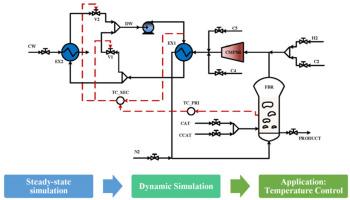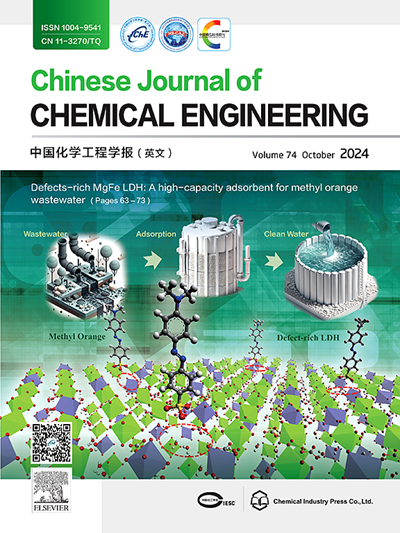气相聚乙烯工艺的稳态和动态模拟
IF 3.7
3区 工程技术
Q2 ENGINEERING, CHEMICAL
引用次数: 0
摘要
气相聚乙烯(PE)工艺是聚乙烯生产最重要的方法之一。深入了解聚乙烯的特性和反应器的稳定性等工艺特征和动态行为,对学术研究人员和工业界都具有重大意义。本研究建立了气相聚乙烯工艺的稳态和动态模型作为模拟平台,可用于研究商业溶液聚乙烯工艺的各种操作任务,如新产品开发、工艺控制和实时优化。共聚动力学参数由工业数据拟合。此外,还开发了一个多反应器系列模型,用于描述流化床反应器内的温度分布。实际工厂数据验证了所开发模型在预测聚合物熔融指数和密度以及动态行为方面的准确性。此外,由于温度控制在工业生产中非常重要,该动态模拟平台还通过一系列模拟实验比较了四种实用的反应器温度控制方案。结果表明,所有四种方案都能有效跟踪设定温度。然而,只有去离子水温度级联控制在处理来自循环气子系统和热交换子系统的干扰方面表现出色。本文章由计算机程序翻译,如有差异,请以英文原文为准。

Steady-state and dynamic simulation of gas phase polyethylene process
Gas-phase polyethylene (PE) processes are among the most important methods for PE production. A deeper understanding of the process characteristics and dynamic behavior, such as properties of PE and reactor stability, holds substantial interest for both academic researchers and industries. In this study, both steady-state and dynamic models for a gas-phase polyethylene process are established as a simulation platform, which can be used to study a variety of operation tasks for commercial solution polyethylene processes, such as new product development, process control and real-time optimization. The copolymerization kinetic parameters are fitted by industrial data. Additionally, a multi-reactor series model is developed to characterize the temperature distribution within the fluidized bed reactor. The accuracy in predicting melt index and density of the polymer, and the dynamic behavior of the developed models are verified by real plant data. Moreover, the dynamic simulation platform is applied to compare four practical control schemes for reactor temperature by a series of simulation experiments, since temperature control is important in industrial production. The results reveal that all four schemes effectively track the setpoint temperature. However, only the demineralized water temperature cascade control demonstrates excellent performance in handling disturbances from both the recycle gas subsystem and the heat exchange subsystem.
求助全文
通过发布文献求助,成功后即可免费获取论文全文。
去求助
来源期刊

Chinese Journal of Chemical Engineering
工程技术-工程:化工
CiteScore
6.60
自引率
5.30%
发文量
4309
审稿时长
31 days
期刊介绍:
The Chinese Journal of Chemical Engineering (Monthly, started in 1982) is the official journal of the Chemical Industry and Engineering Society of China and published by the Chemical Industry Press Co. Ltd. The aim of the journal is to develop the international exchange of scientific and technical information in the field of chemical engineering. It publishes original research papers that cover the major advancements and achievements in chemical engineering in China as well as some articles from overseas contributors.
The topics of journal include chemical engineering, chemical technology, biochemical engineering, energy and environmental engineering and other relevant fields. Papers are published on the basis of their relevance to theoretical research, practical application or potential uses in the industry as Research Papers, Communications, Reviews and Perspectives. Prominent domestic and overseas chemical experts and scholars have been invited to form an International Advisory Board and the Editorial Committee. It enjoys recognition among Chinese academia and industry as a reliable source of information of what is going on in chemical engineering research, both domestic and abroad.
 求助内容:
求助内容: 应助结果提醒方式:
应助结果提醒方式:


